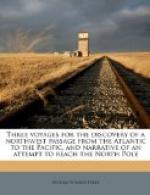While occupied in attending to the soundings, soon after noon, our astonishment may readily be conceived on seeing from the masthead a ship, and soon after two others, in the offing, which were soon ascertained to be whalers, standing in towards the land. They afterward bore up to the northward along the edge of the ice which intervened between us, and we lost sight of them at night. It was now evident that this coast, which had hitherto been considered by the whalers as wholly inaccessible in so high a latitude, had become a fishing station, like that on the opposite or Greenland shore; and the circumstance of our meeting so few whales in Sir James Lancaster’s Sound this season was at once accounted for by supposing, what, indeed, we afterward found to be the case, that the fishing-ships had been there before us, and had, for a time, scared them from that ground.
It was so squally on the morning of the 5th that we could scarcely carry our double-reefed topsails, while, as we afterward learned from the fishing-ships, which were in sight at daylight, there was scarcely a breath of wind at a few leagues’ distance from the land. We coasted this low shore, as we had done in the preceding voyage, at the distance of two or three miles, having from twenty-three to twenty-nine fathoms water. We here met with another of our fishing-ships, which proved to be the Lee, of Hull, Mr. Williamson, master; from whom we learned, among other events of a public nature which were altogether new to us, the public calamity which England had sustained in the death of our late venerable and beloved sovereign, and also the death of his Royal Highness the Duke of Kent. Mr. Williamson, among others, had succeeded in getting across the ice to this coast as high as the latitude of 73 deg., and had come down to this part in pursuit of the fish. One or two of the ships had endeavoured to return home by running down this coast, but had found the ice so close about the latitude of 69 1/2 deg. as to induce most of the others to sail back to the northward, in order to get back in the same way that they came. Mr. Williamson also reported his having, a day or two before, met with some Esquimaux in the inlet named the River Clyde




